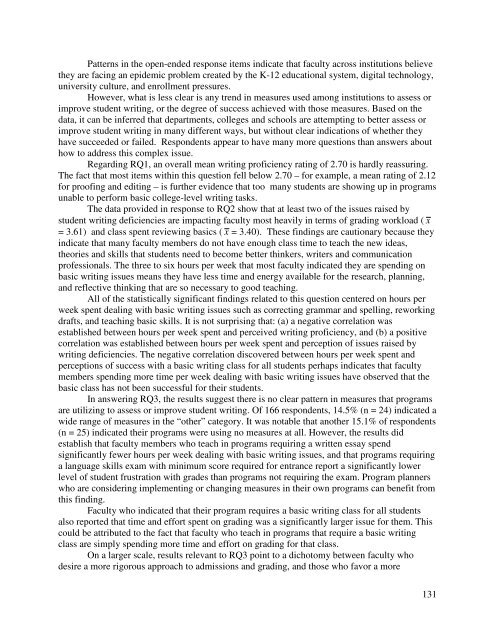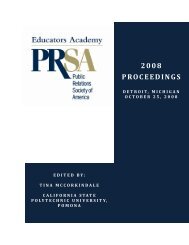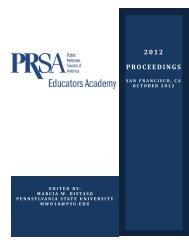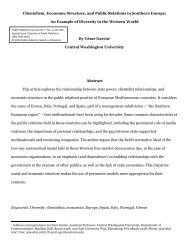2010 - Public Relations Society of America
2010 - Public Relations Society of America
2010 - Public Relations Society of America
You also want an ePaper? Increase the reach of your titles
YUMPU automatically turns print PDFs into web optimized ePapers that Google loves.
Patterns in the open-ended response items indicate that faculty across institutions believe<br />
they are facing an epidemic problem created by the K-12 educational system, digital technology,<br />
university culture, and enrollment pressures.<br />
However, what is less clear is any trend in measures used among institutions to assess or<br />
improve student writing, or the degree <strong>of</strong> success achieved with those measures. Based on the<br />
data, it can be inferred that departments, colleges and schools are attempting to better assess or<br />
improve student writing in many different ways, but without clear indications <strong>of</strong> whether they<br />
have succeeded or failed. Respondents appear to have many more questions than answers about<br />
how to address this complex issue.<br />
Regarding RQ1, an overall mean writing pr<strong>of</strong>iciency rating <strong>of</strong> 2.70 is hardly reassuring.<br />
The fact that most items within this question fell below 2.70 – for example, a mean rating <strong>of</strong> 2.12<br />
for pro<strong>of</strong>ing and editing – is further evidence that too many students are showing up in programs<br />
unable to perform basic college-level writing tasks.<br />
The data provided in response to RQ2 show that at least two <strong>of</strong> the issues raised by<br />
student writing deficiencies are impacting faculty most heavily in terms <strong>of</strong> grading workload ( x<br />
= 3.61) and class spent reviewing basics ( x = 3.40). These findings are cautionary because they<br />
indicate that many faculty members do not have enough class time to teach the new ideas,<br />
theories and skills that students need to become better thinkers, writers and communication<br />
pr<strong>of</strong>essionals. The three to six hours per week that most faculty indicated they are spending on<br />
basic writing issues means they have less time and energy available for the research, planning,<br />
and reflective thinking that are so necessary to good teaching.<br />
All <strong>of</strong> the statistically significant findings related to this question centered on hours per<br />
week spent dealing with basic writing issues such as correcting grammar and spelling, reworking<br />
drafts, and teaching basic skills. It is not surprising that: (a) a negative correlation was<br />
established between hours per week spent and perceived writing pr<strong>of</strong>iciency, and (b) a positive<br />
correlation was established between hours per week spent and perception <strong>of</strong> issues raised by<br />
writing deficiencies. The negative correlation discovered between hours per week spent and<br />
perceptions <strong>of</strong> success with a basic writing class for all students perhaps indicates that faculty<br />
members spending more time per week dealing with basic writing issues have observed that the<br />
basic class has not been successful for their students.<br />
In answering RQ3, the results suggest there is no clear pattern in measures that programs<br />
are utilizing to assess or improve student writing. Of 166 respondents, 14.5% (n = 24) indicated a<br />
wide range <strong>of</strong> measures in the “other” category. It was notable that another 15.1% <strong>of</strong> respondents<br />
(n = 25) indicated their programs were using no measures at all. However, the results did<br />
establish that faculty members who teach in programs requiring a written essay spend<br />
significantly fewer hours per week dealing with basic writing issues, and that programs requiring<br />
a language skills exam with minimum score required for entrance report a significantly lower<br />
level <strong>of</strong> student frustration with grades than programs not requiring the exam. Program planners<br />
who are considering implementing or changing measures in their own programs can benefit from<br />
this finding.<br />
Faculty who indicated that their program requires a basic writing class for all students<br />
also reported that time and effort spent on grading was a significantly larger issue for them. This<br />
could be attributed to the fact that faculty who teach in programs that require a basic writing<br />
class are simply spending more time and effort on grading for that class.<br />
On a larger scale, results relevant to RQ3 point to a dichotomy between faculty who<br />
desire a more rigorous approach to admissions and grading, and those who favor a more<br />
131
















